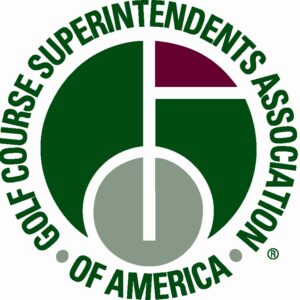LAWRENCE, Kansas – Four golf course superintendents have been selected as recipients of the 2024 Environmental Leaders in Golf Awards (ELGA) by the Golf Course Superintendents Association of America (GCSAA).
The annual awards are presented by GCSAA and Golf Digest in partnership with Syngenta. Eight runners-up also received recognition for their environmental efforts.
 The awards have recognized superintendents and golf courses around the world for their commitment to environmental stewardship since 1993. In 2018 the ELGAs were updated to recognize more superintendents in more focused areas of environmental sustainability. Instead of offering national awards based on facility type, the current version of the ELGAs is based on environmental best management practices and honor specific areas of focus.
The awards have recognized superintendents and golf courses around the world for their commitment to environmental stewardship since 1993. In 2018 the ELGAs were updated to recognize more superintendents in more focused areas of environmental sustainability. Instead of offering national awards based on facility type, the current version of the ELGAs is based on environmental best management practices and honor specific areas of focus.
• The Communications and Outreach Award recognizes effective communication of conservation strategies with facility employees, golfers and other members of the community.
• The Healthy Land Stewardship Award recognizes effective strategies for efficient use of pesticides and nutrients, as well as pollution prevention.
• The Innovative Conservation Award recognizes unique and innovative strategies for conservation.
• The Natural Resource Conservation Award recognizes effective strategies for water conservation, energy conservation and sound wildlife management.
“We are always proud to recognize the environmental leaders in our industry who are committed to keeping golf sustainable,” said GCSAA CEO Rhett Evans. “Not only do golf course superintendents practice environmental stewardship every day, but they do so while providing enjoyable playing conditions.”
The 2024 ELGA winners and runners-up include:
Communications and Outreach Award
Mark Claburn
Tierra Verde Golf Club
Arlington, Texas
Mark Claburn is a 25-year GCSAA member and has been the superintendent at Tierra Verde Golf Club since 2005. This is Claburn’s second ELGA recognition as he was tabbed as the ELGA Public Golf Course and Overall Winner in 2004.
Tierra Verde was the first golf course in Texas and the first municipal golf course in the world to be certified as an Audubon Signature Sanctuary. The public golf course encompasses 263 total acres with 90 acres of managed turf.
Claburn’s outreach includes serving on the board of the North Texas Golf Course Superintendents Association, “Sustainable Dallas” a local environmental and sustainable business organization, the City of Arlington Green Policy Council and the Parks Environmental Committee.
Claburn and the club host tours with multiple environmental science classes at all levels of education, make presentations to local civic groups and speak at many events. Tierra Verde continues to be used as a reference by golf courses and municipalities throughout North Texas for best management practices used in turf management.
“I think as superintendents we sometimes take for granted the great office we have and the technical expertise we possess,” Claburn said. “One of the great benefits of outreach and having non-golfers tour your course with you, is gaining a new passion for your profession when you explain the process of course maintenance and sustainable practices and then see the amazement of someone who has never stepped foot on a green before.”
First Runner-up: Carl Thompson, CGCS, Columbia Point Golf Course, Richland, Wash.
Second Runner-up: Eric Verellen, Snoqualmie Falls Golf Course, Fall City, Wash.
Healthy Land Stewardship Award
Steven Tierney, MG
Golfpark Zurichsee
Wangen, Switzerland
Steven Tierney, MG (Master Greenkeeper), is a 33-year GCSAA member who has been at Golfpark Zurichsee for 26 years. He has been a greenkeeper for 42 years and has earned his second GCSAA environmental award as he was the GCSAA Environmental Leaders in Golf National Overall and International Winner in 2012.
Tierney and his staff use zero insecticide on the property, which is in conjunction with Swiss law. To combat leatherjacket outbreaks, the staff uses black plastic tarps on greens at night and then manually clears the larvae in the morning.
They use 18-foot buffer zones around all water and do not mow wildflower meadow areas before June 10 each year. In addition, a recycling program has reduced waste 30 percent in the last 10 years as the facility works to get as close to zero waste as possible.
“We are guardians of the natural habitats, not just the golf course,” Tierney said. “In my opinion we should be doing everything possible to maintain it to better the environment we live in today and be able to pass it on to the next generations knowing we have done our best to maintain and improve our golf courses and local environments.”
First Runner-up: Michael Bednar, Palouse Ridge Golf Club, Pullman, Wash.
Second Runner-up: Harlyn Goldman, CGCS, Needwood Golf Course, Derwood, Md.
Innovative Conservation Award
Kevin Ackerman
Royal Wood and Country Club
Naples, Fla.
Kevin Ackerman, a 25-year GCSAA member, was the director of agronomy at Royal Wood and Country Club in Naples, Fla., for 11 years before he recently took a job with FMC, an agricultural sciences company. Royal Wood consists of 60 acres of managed turf and 26 acres of lakes and preserves.
Ackerman, who started in agronomy in Michigan, moved to Naples to help develop the first paspalum golf course in the world at The Old Collier Golf Club in 2001.
Ackerman worked with the University of Florida Entomology Department regarding the Tuttle mealybug. Ackerman developed an agronomic plan and chemical application to control the devastating insect. Through his research, numerous courses and chemical companies now target products specifically for mealybug control on golf courses and in the landscaping industry.
“Superintendents face various pressures daily, and the Tuttle mealybug is just one example of the potential challenges faced when maintaining ultradwarf bermudagrass greens,” Ackerman said. “At first glance, the damage caused by this microscopic pest can resemble a disease or nematodes. My success combatting this pest can be attributed to the support of my peers, insights from the University of Florida entomology department, manufacturers and my own independent trails.”
First runner-up: Jorge Mendoza, Green River Golf Club, Corona, Calif.
Second Runner-up: Chris Robson, Glendoveer Golf and Tennis, Portland, Ore.
Natural Resource Conservation Award
Jim Pavonetti, CGCS
Fairview Country Club
Greenwich, Conn.
Jim Pavonetti, CGCS, is a 29-year member of GCSAA and has been the superintendent at Fairview Country Club for 16 years. Pavonetti was the 2023 ELGA Innovative Conservation Award recipient and was the first runner-up for the 2018 and 2019 Natural Resource Awards and the 2021 and 2022 Innovative Conservation Awards.
Among Pavonetti’s conservation efforts are plans on reducing sprinkler irrigation by 20 percent. The course uses ponds that are filled by rain runoff and treated effluent water from the course and neighborhood. The facility regularly tests water quality entering and leaving the property and has proven that water leaving the course is cleaner than when it entered.
The facility conserves energy by using more efficient engines in equipment, replacing old air conditioning and refrigeration units with newer more efficient units, using motion-controlled lighting and converting to all-lithium-powered golf carts.
Efforts to take care of wildlife include adding/expanding native areas, monarch butterfly areas, pollinator areas, bluebird and bat boxes, nesting areas, buffer zones around water and creating no-spray/fertilizer areas.
“I think the ELGA is a great initiative that promotes the good things that golf does for the environment and how environmental stewardship can benefit the golfer’s playing experiences, as well as benefit the surrounding communities while protecting water quality and wildlife habitat,” Pavonetti sad. “I hope more courses and superintendents continue to be recognized for the great things they do every day.”
First Runner-up: James Sua, CGCS, Pei Tou Kuo Golf and Country Club, Taipei, Taiwan
Second Runner-up: Justin Brimley, Crystal Springs Golf Course, Burlingame, Calif.


